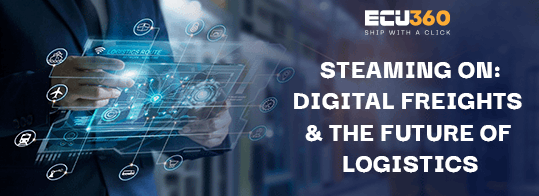Steaming On: Digital Freights & the Future of Logistics

The world’s rapid shift to globalization in the past two decades has laid greater emphasis on trade than ever before. Oceans and rivers have historically always been important for commerce in civilizations from centuries earlier, but shipping today takes place on an unprecedented scale.
Transportation Today: Stuck In A Rut
In this global economy, most organizations show an immense degree of reliance on functioning and robust supply chains. However, suppliers and cargo owners who wish to transport large amounts of products across the world face several daunting challenges. Be it increasing shipping prices or constant port congestion, there is a severe amount of uncertainty in this sector.
In fact, in March 2021, when the Ever Given blocked the Suez Canal, there was an estimated hold up of $400 million an hour, or $6.7 million every passing minute. Trade and transport have become invaluable, but they have also become extremely expensive. and the technology could be just the solution to bring down these expenses while increasing the effectiveness of the industry.
Reinventing the Wheel For Freighting
People in the transport industry would be well aware that a single slip-up in the supply chain would probably affect the entire journey, causing potential losses for suppliers and sellers. Therefore, it has become crucial to opt for the best shipping option for you and to have a system that is dynamic, dependable, and easy to track. As businesses continue to grapple with obstacles like driver shortages, capacity limits, and rising costs, digital freighting can change the game by connecting the world’s various carriers and the companies that depend on them.
Digital innovations in the freighting industry have allowed new platforms to launch that match small and huge carriers with businesses that wish to get their goods delivered in the most cost-effective and quick way possible. As the industry goes through significant restructuring in the age of the internet, it may not be long before you can transport thousands of tons of goods with just a few clicks.
As these changes continue and companies continue to evolve, the only transportation services that will remain will be those that offer unparalleled efficiency and transparency, along with eliminating the need for costly intermediaries. Cargo owners and logistics companies are both certain to be affected by this change, and only those players who evolve within time will be the ones with a secure footing in a digitized market.
Digitization: Less Freight, Better Freight
There can often be great misunderstandings about the role of technology in revising sectors. Digitization in the industry would not involve the replacement of humans, but rather the improvement of the activities carried out by workers that are part of your system. The pandemic has been a stark reminder of the need for the transport and shipping industry to inculcate technology in its processes and reduce its dependency on archaic practices to stay competitive in the market.
With strategic and impactful digitization, we are now transitioning towards an innovative reimagining of the supply chain network, with a link being created between the vastly interconnected and complex freight marketplace and modern technologies such as data analysis, automation, AI, and machine learning.
Bridging Industry Gaps for A Smoother Ride
Digital freight transitions continue to work towards addressing global supply chain issues by resolving the challenges shippers and carriers face. Going beyond acting as a platform to connect businesses, the use of technology can help create more efficient loading and unloading processes, address logistical issues and utilize data insights to better definite routes and frequencies.
Finally, a unified platform, much like Uber, could help owners choose from an extensive list of freight forwarders and delivery companies that address their needs while ensuring a transparent, fair, and stable pricing system. Amidst fluctuating fuel prices and other expenses, such a system can standardize the industry while providing reliable service. Soon, your smartphone alone could be enough for you to solve all your freight woes.
Preparing For the Inevitable: Strategize and Digitize
We are only in the early days of the digitization of the transport and shipping industry. The journey has only just begun with modern revisions in booking, scheduling, signing, and monitoring systems. Soon, as digital freight software systems evolve and grow even more automated, companies may have to reexamine their business models and adjust to a changing market.
Technology is expected to streamline our transport processes soon and make them efficient for every party involved. It would be your role as a business to predict the change and adjust to it before it is too late. The first movers in the space are the ones who shall dominate, so ensure that your enterprise is one of them. The transportation revolution awaits.
ECU360’s solutions use technology to make the freight forwarding process unified. You do not have to view multiple emails, browse through huge excel sheets, or scour numerous physical documents. Instead, you have all the information in one place, making it seamless.
